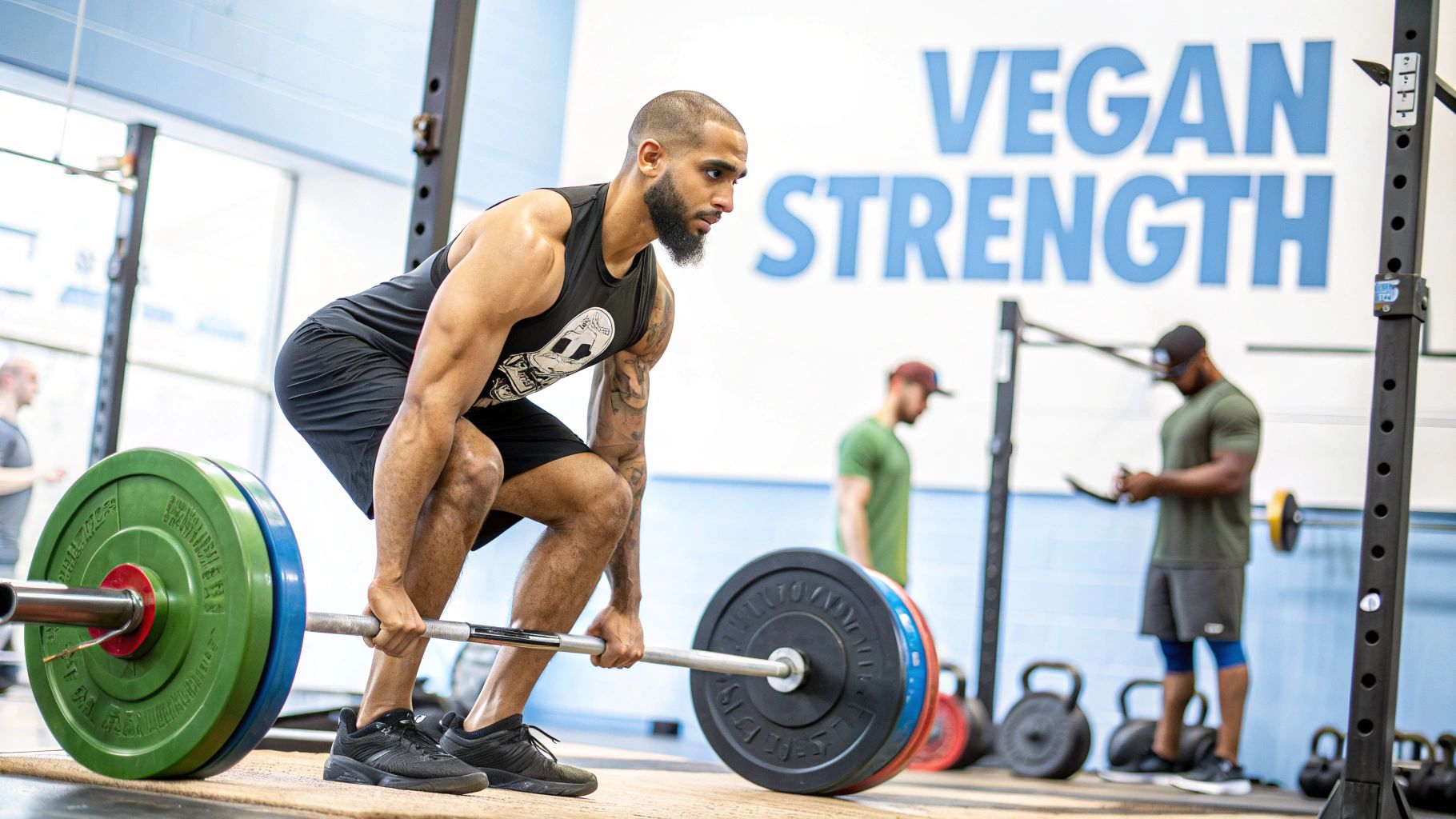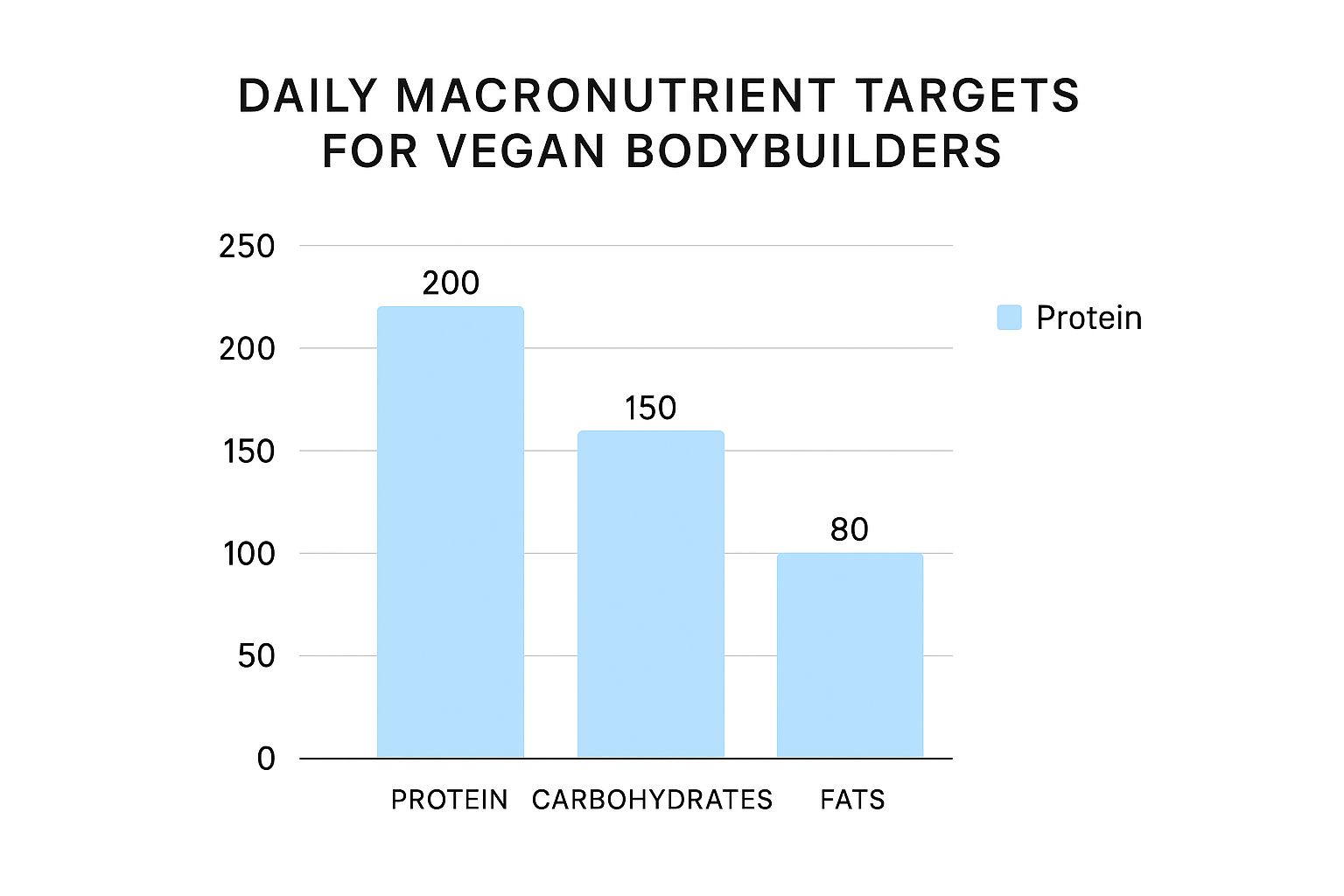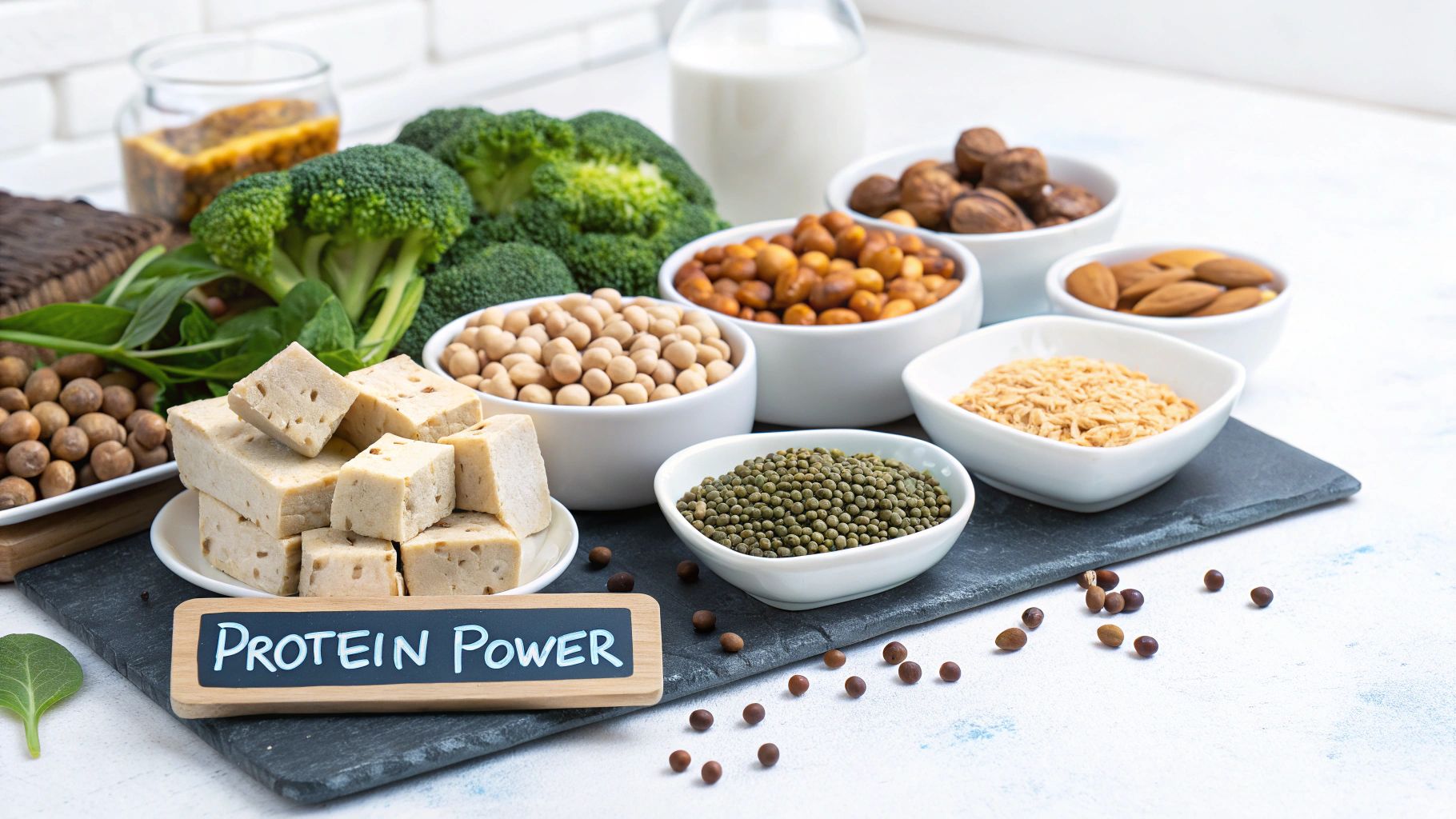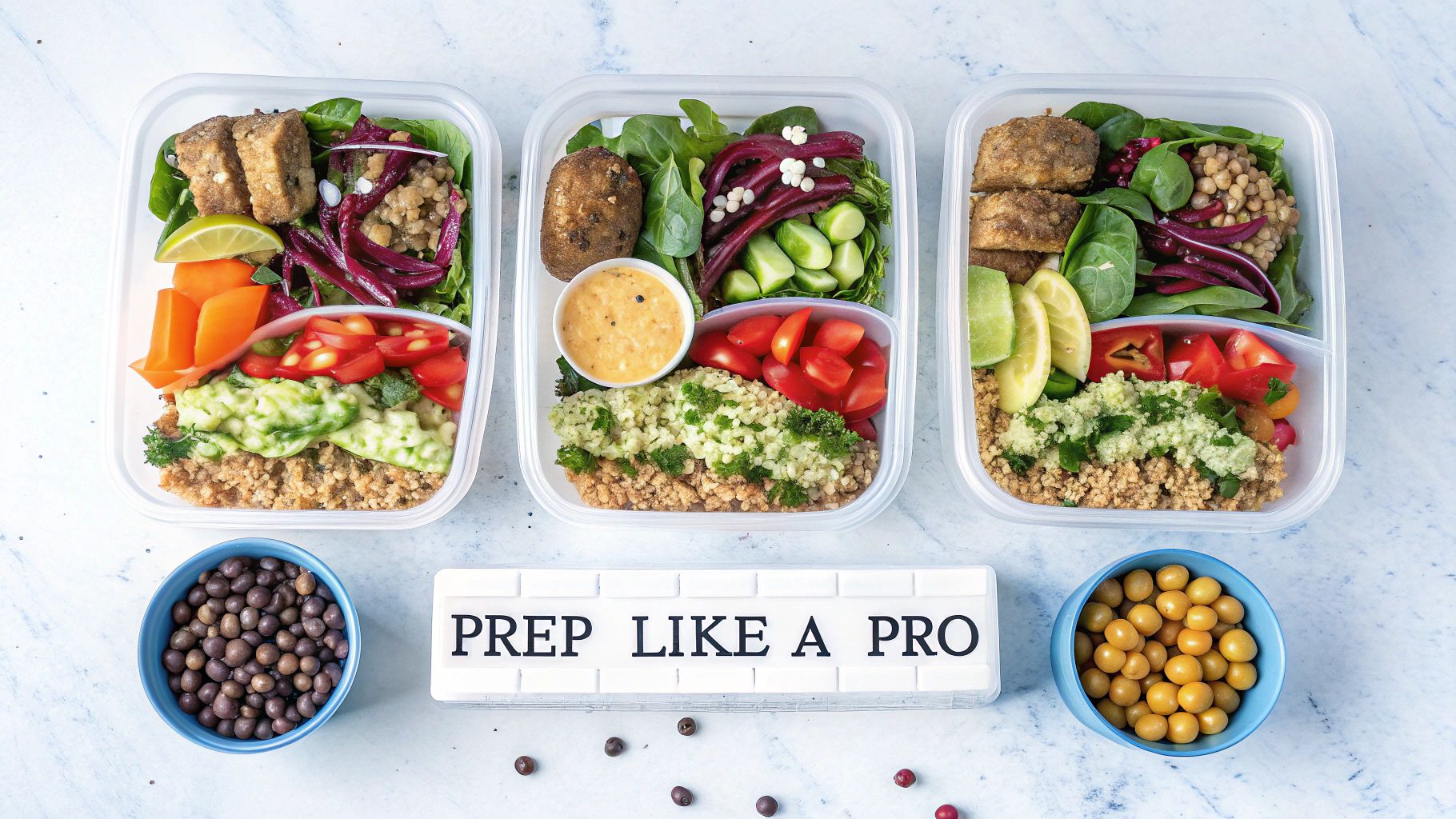Mastering Vegan Nutrition for Serious Muscle Gains

Building serious muscle on a vegan diet takes more than just loading up on tofu. It requires a strategic approach to nutrition, focusing on maximizing your intake of key nutrients and optimizing meal timing. This involves understanding how plant-based nutrition uniquely fuels muscle development and adapting strategies used by successful vegan bodybuilders. Let's explore the key principles that can power your plant-based gains.
Macronutrient Ratios for Vegan Bodybuilders
Just like any bodybuilder, vegans need to prioritize protein. However, the sources and timing require careful consideration. A common target is 1.6 grams of protein per kilogram of body weight, distributed throughout the day. This steady supply of amino acids is essential for muscle protein synthesis.
Adequate carbohydrates are also crucial. They fuel your workouts and replenish glycogen stores, allowing you to push harder and recover faster. Finally, don't forget healthy fats from sources like avocados, nuts, and seeds. These support hormone production and overall health.
Protein Timing and Caloric Intake
Strategic protein timing can maximize muscle protein synthesis. Consuming protein around your workouts—both before and after—is particularly effective. This provides the necessary building blocks for muscle repair and growth. For example, a pre-workout shake with Cantein's organic hemp protein powder can prepare your muscles for the challenge ahead.
Your overall caloric intake should also align with your goals. Whether you're bulking, cutting, or maintaining, your caloric needs will determine the portion sizes of your meals.
Addressing the Protein Quality Debate
One common concern about vegan bodybuilding is the perceived lower quality of plant-based protein. However, this is largely a misconception. While individual plant sources may lack certain amino acids, combining a variety of foods ensures you receive a complete amino acid profile.
For example, combining legumes with grains creates a complete protein source. This provides all the essential building blocks your body needs, allowing vegan bodybuilders to achieve optimal muscle growth.
Meeting your protein needs while in a caloric deficit can be challenging for vegan bodybuilders. One study found that while vegan and omnivore bodybuilders have similar energy intake patterns, vegans often struggle to achieve adequate protein intake while maintaining the caloric deficit needed for body composition changes. Explore this topic further. This highlights the importance of strategic meal planning and potentially supplementing with high-quality vegan protein powders.
Many vegan athletes successfully overcome this obstacle by incorporating high-protein plant-based foods like legumes, tofu, and tempeh into their vegan bodybuilding meal plans. This allows them to maintain a positive nitrogen balance and support muscle growth even in a caloric deficit, proving that with careful planning, a vegan diet can effectively fuel bodybuilding success.
Plant Protein Powerhouses You're Probably Overlooking
Beyond tofu and lentils, a world of plant-based protein sources awaits, ready to fuel your vegan bodybuilding journey. Discovering these often-overlooked protein sources, combined with smart preparation methods, can significantly impact your muscle-building progress. This allows you to diversify your diet and optimize your protein intake for maximum gains.
Unveiling Hidden Protein Gems
While staples like tofu and lentils are excellent, exploring less common options can add variety and valuable nutrients to your vegan bodybuilding meal plan. For example, quinoa provides a complete protein source, offering all nine essential amino acids vital for muscle growth. Similarly, chia seeds are packed with protein and fiber, promoting fullness and aiding digestion.
- Quinoa: A versatile grain perfect for bowls, salads, or as a side dish.
- Chia Seeds: Easily added to smoothies, yogurt, or overnight oats.
- Hemp Seeds: Offer a nutty flavor and excellent protein content, ideal for sprinkling on salads or blending into shakes.
- Edamame: Young soybeans, providing a good source of protein and fiber.
When optimizing your vegan bodybuilding meal plan, consider how to maintain energy levels throughout the day, similar to the advice found in this article on natural energy boosters.
Maximizing Protein Absorption
Certain preparation techniques can greatly influence how your body absorbs protein from plant-based foods. Soaking and sprouting grains and legumes can reduce anti-nutrients that hinder protein utilization. Combining different protein sources throughout the day ensures you receive a complete amino acid profile, optimizing muscle protein synthesis.
Practical Meal Examples for Vegan Bodybuilders
Competitive vegan bodybuilders often combine different plant proteins strategically to ensure complete amino acid intake throughout the day. A breakfast might include quinoa porridge with berries and hemp seeds. Lunch could feature a lentil and brown rice salad. For dinner, a tofu stir-fry with brown rice noodles provides another protein boost.

This infographic visualizes daily macronutrient targets for vegan bodybuilders, outlining protein, carbohydrate, and fat recommendations. Achieving this balance requires careful consideration of each macronutrient. Protein is prioritized for muscle growth, while carbohydrates and healthy fats provide sustained energy and support overall well-being. Check out our guide on the top 10 tastiest plant-based protein powders. This information empowers you to structure your meals effectively, maximizing your bodybuilding potential on a vegan diet.
To further illustrate the variety of protein sources available, let's look at a comparison of some top options.
The following table provides a comprehensive comparison of plant-based protein sources, showing protein content per serving, complete amino acid profiles, and practical serving suggestions.
| Food Source | Protein/100g | Complete Protein? | BCAAs Content | Best Serving Methods |
|---|---|---|---|---|
| Quinoa | ~14g | Yes | Moderate | Bowls, salads, porridge |
| Chia Seeds | ~17g | No | Moderate | Smoothies, yogurt, pudding |
| Hemp Seeds | ~30g | Yes | High | Salads, shakes, yogurt |
| Edamame | ~12g | Yes | Moderate | Steamed, roasted, in stir-fries |
| Lentils | ~26g | No | High | Soups, stews, salads |
| Tofu | ~8g | Yes | Moderate | Stir-fries, scrambles, baked |
This table highlights the diverse protein content and amino acid profiles of various plant-based options. While some, like quinoa and hemp seeds, offer complete proteins, others are excellent sources of essential amino acids and can be combined for a complete profile. The "Best Serving Methods" column provides practical ideas for incorporating these foods into a balanced vegan bodybuilding diet.
Why Plant-Based Athletes Often Outperform Expectations

Many assume a vegan diet restricts athletic performance. Surprisingly, plant-based eating can actually offer several advantages for serious athletes, including bodybuilders. These benefits come from the unique nutritional profile of plant-based foods and their positive impact on the body. Vegan athletes are often seeing impressive gains in strength, endurance, and overall physique.
Enhanced Recovery and Reduced Inflammation
Plant-based diets are packed with antioxidants and phytonutrients. These compounds play a vital role in reducing inflammation in the body. This is especially helpful for bodybuilders who experience microscopic muscle damage and inflammation from intense training.
By focusing on fruits, vegetables, and whole grains, vegan bodybuilders can speed up their recovery and minimize muscle soreness. This allows them to train harder and more often. Additionally, a vegan diet often leads to better gut health.
A healthy gut improves nutrient absorption and strengthens the immune system – both essential for optimal training and recovery. Fiber-rich plant-based foods fuel the growth of beneficial gut bacteria. This improved gut health further boosts the performance and well-being of vegan athletes.
Optimizing Hormonal Balance
A well-planned vegan diet can also positively affect hormonal balance, which is key for muscle growth and recovery. Plant-based foods tend to be lower in saturated fat and cholesterol compared to animal products, promoting healthier blood lipid profiles and better insulin sensitivity.
This hormonal optimization creates a favorable environment for muscle protein synthesis and minimizes fat storage. This means the body is better able to build muscle and less likely to store fat.
Addressing Training Challenges With Plant-Based Strategies
Specific plant-based strategies can effectively tackle common training hurdles. Nutrient-dense smoothies, perhaps with ingredients like Cantein’s organic hemp protein powder, can provide sustained energy for tough workouts.
Adding anti-inflammatory foods such as turmeric and ginger can help manage post-workout muscle soreness. Prioritizing carbs, especially around training sessions, ensures optimal glycogen replenishment. This translates to consistent energy levels for peak performance. These practical applications of plant-based nutrition lead to noticeable improvements in training results for vegan bodybuilders.
A study involving 52 physically active people, 22 of whom were vegan, found that while vegan athletes weighed slightly less, their peak power output wasn't significantly different from omnivores. This suggests that a well-planned vegan diet can support the demands of bodybuilding without impacting muscle power. Explore this topic further. Further research on VO2 max and peak torque even suggests potential performance improvements in some vegetarian groups. These findings indicate that vegan bodybuilders can absolutely reach high levels of performance with proper dietary planning.
Your Complete 7-Day Vegan Bodybuilding Meal Plan
Building muscle on a vegan diet requires a well-structured approach. It's not just about eating more tofu; it's about strategic nutrient timing and ensuring a proper balance of macronutrients for optimal growth and recovery. This 7-day vegan bodybuilding meal plan provides a comprehensive framework for achieving your physique goals.
Macronutrient Targets for Different Phases
This plan features separate guidelines for bulking, cutting, and maintenance phases. Each phase has specific macronutrient targets designed to support muscle growth and recovery, whether your goal is to gain mass, shed fat, or maintain your current physique.
To illustrate the macronutrient breakdown for each phase, the following table offers a sample daily intake based on a 2500 calorie diet:
Vegan Bodybuilding Meal Plan Macronutrient Breakdown
| Phase | Daily Calories | Protein (g) | Carbs (g) | Fats (g) | Sample Day |
|---|---|---|---|---|---|
| Bulking | 2800 | 200 | 400 | 80 | See Day 1 |
| Cutting | 2200 | 200 | 250 | 50 | See Day 4 |
| Maintenance | 2500 | 180 | 300 | 70 | See Day 7 |
These values provide a starting point. Remember to adjust these numbers based on your individual caloric needs, activity levels, and specific bodybuilding goals.
7-Day Meal Plan Overview
This plan provides five meals each day, strategically timed to optimize nutrient absorption and muscle protein synthesis. This meal frequency ensures a consistent supply of amino acids and energy throughout the day, promoting muscle growth and repair. The meals incorporate a variety of delicious and nutritious plant-based protein sources.
-
Day 1 (Bulking): Focus on calorie-dense foods like quinoa, lentils, and nuts, along with ample fruits and vegetables. A sample breakfast could be a Cantein hemp protein smoothie with berries and bananas. Lunch might include a lentil and brown rice bowl.
-
Day 2 (Bulking): Similar to Day 1, with variations in protein sources and vegetables. Try a tofu scramble with whole-wheat toast and avocado for breakfast. Dinner could be a hearty chickpea curry with brown rice.
-
Day 3 (Bulking): Continue with the bulking plan, emphasizing whole foods and strategic carb timing around workouts. A post-workout meal could be a vegan protein shake and a banana.
-
Day 4 (Cutting): Transition to a lower-calorie intake, emphasizing lean protein sources and fibrous vegetables. Lunch might be a salad with grilled tofu and a light vinaigrette. For dinner, try roasted vegetables with tempeh.
-
Day 5 (Cutting): Maintain the calorie deficit, prioritizing portion control and nutrient density. Overnight oats with berries and nuts are a good breakfast option.
-
Day 6 (Cutting): Continue the cutting plan, incorporating variety to prevent boredom and ensure sufficient micronutrient intake. Enjoy a veggie burger on a whole-wheat bun with a side salad.
-
Day 7 (Maintenance): Balance your calorie intake with your activity level to maintain your current physique. Focus on enjoying a diverse range of plant-based foods that are both nutritious and flavorful.
Meal Prep and Timing
Each day's plan includes shopping lists, prep instructions, and batch cooking strategies to save you time. This allows for easy meal preparation in advance, even with a busy training schedule. The plan also includes key timing recommendations for pre- and post-workout nutrition. Consuming easily digestible carbohydrates and protein before and after training can maximize energy and support muscle recovery.
This plan, developed in consultation with plant-based athletes, provides nutritionally sound, flavorful, and satisfying meals. Understanding that dietary needs and preferences vary, the plan includes practical alternatives to accommodate different tastes and restrictions. You can also adjust portions based on your specific caloric requirements and training intensity to ensure the plan aligns with your bodybuilding goals.
Essential Supplements for Plant-Based Muscle Building

Navigating the world of supplements can feel overwhelming, especially when you're a vegan bodybuilder. So many products make big promises. How do you know what actually works? This section explores the supplements that truly make a difference for plant-based muscle growth, focusing on those supported by research and designed for the needs of vegan athletes.
Key Nutrients for Vegan Bodybuilders
Some nutrients are harder to get enough of on a vegan diet. Supplements can help bridge the gap for optimal performance and recovery. Vitamin B12, primarily found in animal products, is a critical supplement for vegans. Cantein discusses the importance of other nutrients such as leucine as well.
Creatine, crucial for muscle energy, can also be beneficial, even though it exists naturally in plants in small amounts. Finally, omega-3 fatty acids and iron need attention. Plant-based sources exist, but ensuring adequate intake through diet and supplements is essential.
Dosing and Timing for Optimal Results
Just taking a supplement isn't enough; how much and when you take it matters. For B12, a typical recommendation is 250-500 mcg daily or weekly, depending on the type. Creatine usually involves a loading phase of 20 grams daily for 5-7 days, followed by a maintenance dose of 3-5 grams per day.
The best way to take omega-3s and iron depends on the specific type and individual needs. Talk to a doctor or registered dietitian for personalized advice.
Separating the Essential from the Unnecessary
Many popular supplements are heavily marketed but don't offer significant advantages for vegan bodybuilders. Prioritizing core nutrients like B12, creatine, omega-3s, and iron is usually more effective than using many supplements with less scientific support. This focused approach optimizes nutrient intake without wasted expense, letting you prioritize what truly matters for your bodybuilding goals.
Emerging Supplements for Plant-Based Athletes
Beyond the basics, new supplements are showing promise for plant-based athletes. It's important to be realistic, though. Research into their long-term effects and how they interact with other nutrients is still ongoing. Staying updated on the latest science is crucial when considering new supplements.
Quality and Safety in the Supplement Market
The supplement industry isn't heavily regulated, so choosing high-quality products from reputable brands is crucial. Look for third-party testing and certifications that confirm a supplement's purity and potency. This protects you from harmful contaminants and ensures you're getting what you paid for. A careful approach helps you make safe and effective choices to support your vegan bodybuilding journey.
Timing, Stacking, and Product Selection
Getting the most from your supplements involves smart timing and potential stacking. Some, like creatine, can be taken anytime. Others, like B12, may absorb better with food. Knowing how supplements interact helps you maximize their benefits.
Avoid excessive stacking without professional guidance, as this can create nutrient imbalances. Researching reputable brands and consulting healthcare professionals or registered dietitians is key for a safe and effective supplement plan.
Connecting With the Vegan Bodybuilding Community
Starting your vegan bodybuilding journey might feel like you're going it alone, but a thriving and supportive community awaits. Connecting with other vegan bodybuilders offers valuable motivation, practical tips, and a sense of camaraderie.
Finding Your Tribe: Online and Offline Resources
This growing community provides a wealth of online and offline resources. Online forums, social media groups, and dedicated websites are great platforms for sharing vegan bodybuilding meal plan ideas, training routines, and inspiring stories. Many Facebook groups, for instance, focus specifically on vegan fitness.
Offline, local vegan meetups and fitness groups facilitate in-person connections. This gives you the chance to share experiences, learn from others, and build a supportive local network. Specialized coaching services and plant-based meal delivery options are also becoming increasingly common. These services can simplify your nutrition and training, making it easier to reach your peak performance.
The rising demand for plant-based products highlights this growing trend. Market projections anticipate sales to reach $162 billion by 2030. This growth is driven by a broader focus on health and sustainability, values often shared by vegan bodybuilders. A 17% increase in vegan food orders on platforms like Grubhub reflects the shift toward plant-based diets. Events like Veganuary, encouraging a month of vegan eating, frequently lead to long-term reductions in animal product consumption. Learn more about these trends with these insightful vegan statistics. As a result, vegan bodybuilders now have a wider selection of plant-based options to fuel their workouts and achieve their fitness goals.
Learning From Experienced Vegan Bodybuilders
Connecting with seasoned vegan bodybuilders is invaluable. They can provide guidance on overcoming common challenges, finding the right support system, and optimizing training and nutrition. Their firsthand experiences offer practical advice for handling various situations, from navigating social gatherings to maintaining a vegan bodybuilding meal plan while on the go.
Maintaining hormonal balance is crucial for muscle growth. Certain supplements, like testosterone boosting supplements, can help optimize hormone levels. This can be particularly important for vegan bodybuilders looking to maximize their physique development.
Navigating Social Situations and Maintaining Your Nutrition Plan
Social events can present unique challenges for vegan bodybuilders. However, with a bit of planning and open communication, these challenges can be easily managed. When dining out, researching vegan-friendly restaurants or contacting them beforehand to discuss menu options ensures a smooth experience. Packing vegan protein bars and snacks while traveling helps maintain your nutrition on the road.
Openly sharing your dietary choices with friends and family creates a more supportive environment. Explaining your vegan lifestyle can educate and inspire others, fostering understanding and minimizing potential dietary issues.
Joining the vegan bodybuilding community unlocks valuable resources and support. This network provides encouragement, practical tips, and a shared sense of purpose, empowering you to achieve your bodybuilding aspirations while enjoying the many benefits of a plant-based lifestyle.
Breaking Through Plateaus on Your Plant-Based Journey
Hitting a plateau can be incredibly frustrating, especially when you're committed to a vegan bodybuilding meal plan. Your body adapts, your fitness goals change, and what worked before might not be enough anymore. Let's explore some common roadblocks encountered by plant-based bodybuilders and how to overcome them.
Identifying the Root Cause of Your Plateau
Unexpected weight plateaus, difficulty recovering, and inconsistent energy levels can all be signs that your vegan bodybuilding meal plan needs some tweaking. The first step is figuring out whether the issue lies with your training, nutrition, or recovery. Are you consistently challenging yourself at the gym? Are you consuming enough calories and macronutrients? How's your sleep and stress management?
For example, if your strength gains have stalled, it might be a training issue, indicating a need to increase weight, sets, or reps. On the other hand, if you're constantly tired, it could point to a nutritional deficiency or lack of sleep. This careful evaluation is key to implementing the right solutions and breaking through your plateau.
Addressing Nutrient Insufficiencies
Even with a carefully planned vegan bodybuilding meal plan, certain nutrient deficiencies can hold back your progress. Iron, vitamin B12, and omega-3 fatty acids are common areas of concern for vegan athletes. Recognizing the warning signs is important: fatigue, weakness, and decreased performance can all suggest a potential deficiency. Learn more in our article about hemp protein for muscle gain.
Addressing these insufficiencies means incorporating specific foods into your vegan bodybuilding meal plan and perhaps considering supplements. For instance, iron-rich foods like lentils and spinach, paired with vitamin C-rich foods to improve absorption, can boost iron levels. Likewise, supplementing with B12 and algae-based omega-3s can help ensure you're meeting your nutritional needs.
Troubleshooting Frameworks for Vegan Bodybuilders
Think of your body as a well-oiled machine. Each component—training, nutrition, and recovery—needs to function smoothly for optimal performance. If one area falters, the whole system suffers. This highlights the need for a holistic approach to troubleshooting plateaus.
-
Training Plateau: If you've hit a wall in the gym, consider changing your training split, trying new exercises, or increasing the intensity of your workouts. This can stimulate muscle growth and break through stagnation.
-
Nutritional Plateau: If you're not fueling your body effectively, your training efforts won't yield results. Analyze your vegan bodybuilding meal plan and make sure you're meeting your macronutrient needs. Modify your calorie intake and macronutrient ratios as needed to support your goals, whether that's building muscle, losing fat, or maintaining your physique.
-
Recovery Plateau: Overtraining and insufficient rest can hinder progress just as much as a poor diet. Prioritize sleep, manage stress, and include active recovery methods like stretching and yoga to optimize recovery and support muscle growth.
Action Plans for Each Scenario
Once you've identified the probable cause of your plateau, you can develop a personalized action plan. This might involve modifying your training program, adjusting your vegan bodybuilding meal plan, or adopting new recovery strategies.
This targeted approach ensures you're tackling the root of the problem, rather than just trying random solutions. For a nutritional plateau, for example, changing your macronutrient ratios or trying new protein sources could be the key. If recovery is the issue, prioritizing sleep and incorporating active recovery could get you back on track.
By systematically addressing potential obstacles, you can maintain steady progress throughout your plant-based bodybuilding journey. This proactive approach helps you overcome challenges and continue achieving your physique goals.
Ready to fuel your plant-based gains with clean, effective nutrition? Discover the power of Cantein's organic hemp protein powder and other premium plant-based products. Visit Cantein today to learn more and unlock your full potential.

